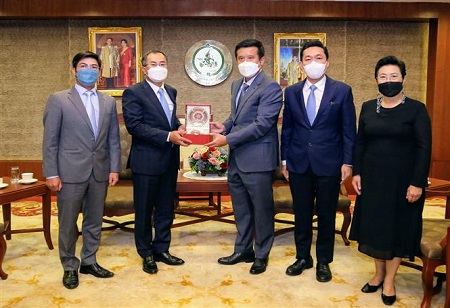
Vietnam, Thailand inks MoU to Enhance Cooperation in Digital Transformation, Economy

 Thailand and Vietnam have agreed to cooperate in information infrastructure, cloud computing, social network management, digital transformation, and the digital economy. The Minister of Digital Economy and Society from Thailand, Chaiwut Thanakamanusorn, recently affirmed this during his meeting with the Vietnamese Ambassador to Thailand, Phan Chi Thanh. The meeting took place after Vietnam and Thailand held the fourth meeting of their Joint Trade Committee (JTC) in Bangkok.
Thailand and Vietnam have agreed to cooperate in information infrastructure, cloud computing, social network management, digital transformation, and the digital economy. The Minister of Digital Economy and Society from Thailand, Chaiwut Thanakamanusorn, recently affirmed this during his meeting with the Vietnamese Ambassador to Thailand, Phan Chi Thanh. The meeting took place after Vietnam and Thailand held the fourth meeting of their Joint Trade Committee (JTC) in Bangkok.
Officials proposed that Thailand and Vietnam’s Ministry of Information and Communications (MIC) intensify information sharing, promote digital collaboration, enhance cooperation on digital transformation, and sign a memorandum of understanding (MoU) to facilitate joint activities in a post-pandemic world. Thanh suggested the two sides establish a mechanism to exchange and share experiences of digital transformation and digital economic development in line with each country’s growth strategy.
According to reports, Thanh stressed that both sides ramp up cooperation in fake news management to establish a safe and healthy online environment. The Vietnamese ambassador proposed that Thailand create favourable conditions for Vietnamese information technology enterprises to invest and do business in the country. He suggested that the two ministries resume working visits and meetings at all levels.
For his part, Minister Chaiwut stated that the two sides should continue promoting cooperation activities after the two-year-long hiatus due to the COVID-19 pandemic. He agreed to restart bilateral exchanges between the two ministries at all levels, affirming to support and facilitate Vietnamese IT firms’ investments in the country, thus contributing to further promoting cooperation in investment, trade, and tourism between Thailand and Vietnam.
Both countries have been bolstering digital transformation efforts over the past few years. Last December, 15 areas were earmarked for the Thai government to implement the development of smart cities. The plan is oriented towards future trends and the increasingly ubiquitous digital economy and aims to get Thailand in line for growing the economy now and in new sectors. To keep up with demand in the new digital world, the plan also focuses on developing and enhancing human resources. The idea of using digital technology in smart cities to improve people’s quality of life is part of the 13th National Economic and Social Development Plan, which is set to launch from 2023 to 2027.
In Vietnam, the Prime Minister approved the country’s national digital transformation programme in 2020. It targets that by 2025, the digital economy will make up 20% of Vietnam’s gross domestic product (GDP) and at least 10% of each sector. Vietnam aims to become one of the 50 best performers in the ICT Development Index and the Global Competitiveness Index, and among the 35 leading countries in the Global Innovation Index by that year.
The government also set up the National Committee on Digital Transformation, which will implement mechanisms and policies to digitally transform the country and administrative tasks. According to the Prime Minister, who is the head of the committee, the group will develop a digital transformation infrastructure, apply digital technology, mobilise resources through public-private cooperation, and improve the management capacity and quality of human resources.
In the first quarter of this year, Vietnam’s digital economy revenue reached US$ 53 billion. During the same period, the Internet digital economy’s growth rate was 28%, reaching US$8 billion in revenues. The ICT digital economy and digital economy of industries each had average revenue growth rates of about 15%. By the end of February, the number of newly-established digital technology enterprises reached 65,329, an increase of 487 enterprises compared to 2021, as per reports from trusted sources.

